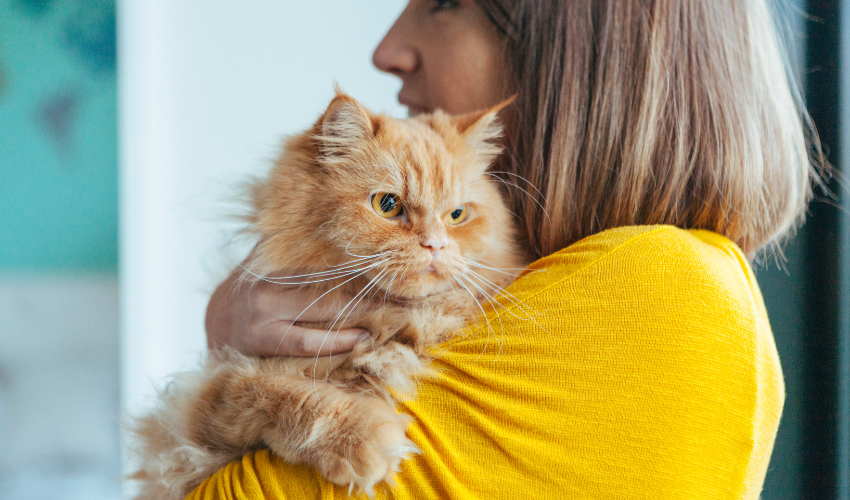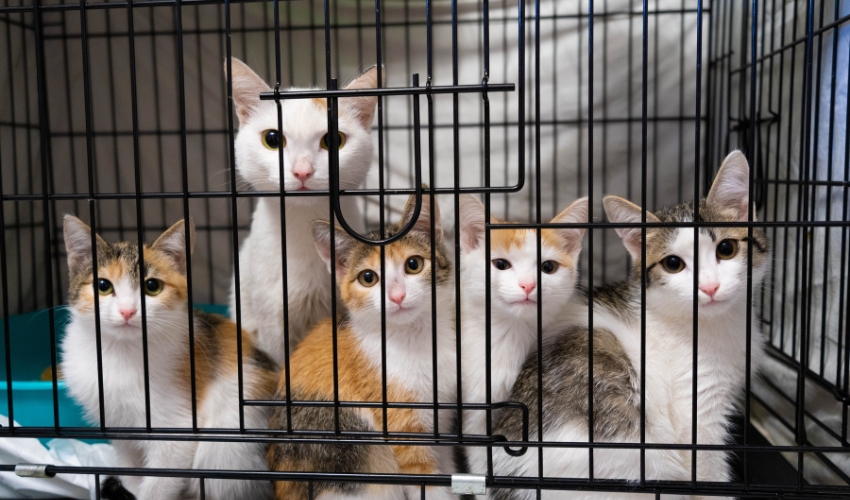Unbeknownst to many, cats living with the FIV-positive diagnosis have often had their adoption chances overlooked; sadly resulting in euthanasia for too long. However, recent evidence has revealed that these kitties could be just as adoptable and live a full lifespan compared to those without.
If you’re looking to adopt a kitty who just so happens to be positive for FIV, here’s what you should know before making the commitment – this way, you can prepare yourself and your home to make sure it’s the right fit!
What is FIV?
So, what is FIV positive in cats? Feline Immunodeficiency Virus (FIV) is a virus that is similar to human HIV and it weakens a cat’s immune system. Cats infected with FIV can remain healthy for years, but they can develop what is commonly known as FIV Positive Disease. It is characterized by an increased susceptibility to other diseases and infections, such as those of the respiratory, urinary, gastrointestinal, and reproductive systems! This condition significantly reduces the lifespan of affected cats and makes regular vet check-ups all the more important. Proper nutrition and avoiding exposure to other cats help reduce the risks associated with FIV, but there are no treatments to prevent or cure it – only supportive care is available. FIV is often associated with FeFV or Feline Foamy Virus. It’s crucial to know what is FIV Positive in cats compared to FeFV in order to know their difference in terms of treatment and care.
How is FIV Diagnosed?
FIV or Feline Immunodeficiency Virus is a serious disease that can affect cats worldwide. The virus attacks the cat’s immune system, making it difficult for them to fight off infections. Diagnosing this virus can be tricky; a veterinarian will typically take a detailed history of the signs and symptoms the cat is displaying and perform a physical exam. Additional testing such as blood tests may also be performed in order to understand what type of infection your cat is suffering from. It is important to note that what reads as “FIV Positive” on some tests indicates that the cat has antibodies to the virus, although this does not necessarily mean they are infected. If needed, additional tests can be done to get conclusive results.
Ultimately, a physical exam by a veterinarian combined with lab results can provide an accurate diagnosis as to what type of infection the cat has and what treatment plan should be implemented to ensure its wellness.
How Long Can A FIV Positive Cat Live?

Just like HIV can weaken the human immune system, FIV+ cats are more susceptible to infections. Due to immunosuppression caused by FIV, your cat’s body is less able to fight off even normal bacteria that healthy felines would typically be fine with – meaning they could easily get sick from something seemingly harmless.
Thankfully, FIV+ cats can enjoy a long, happy life – up to 10 years or more! However, they may sometimes experience complications from secondary infections or even typical aging issues. It is important that the FIV status of all cats be determined when they are first acquired if they become ill, and regularly if they have any risk of exposure.
Signs of FIV in Cats
FIV diagnosis can often be made with a routine blood screening test and the results may show zero symptoms. However, more severe signs could include:
- Lethargy
- Inflammation of the gums (e.g., gingivitis) and mouth (e.g., stomatitis) with secondary signs of halitosis, drooling, or chewing abnormally
- Subtle, chronic weight loss
- Chronic gastrointestinal signs (e.g., diarrhea)
- Chronic upper respiratory infections (e.g., runny eyes, sneezing, nasal discharge)
- Neurologic signs (e.g., behavioral changes, seizures)
- Chronic ocular infections (e.g., runny eyes, cloudy appearance to the inside of the eye, conjunctivitis or “pink eye”)
- Chronic skin problems (e.g., hair loss, thin coat, redness, itching, secondary bacterial infections)
- Enlarged lymph nodes or swellings on the body
- Urinary problems
How do you keep FIV positive cats healthy for as long as possible?
As a loving cat parent, you want to ensure your FIV positive feline can experience their best life. Although the lifespan of such cats may be shorter than that of an otherwise healthy kitty, there are some steps you can take! Follow these 4 tips for keeping an FIV+ cat happy and healthy:
#1 Prioritize veterinary care
Your cat’s well-being is crucial! To ensure your furry companion stays healthy, make sure they receive regular vaccinations and have a twice-annual checkup with their vet. Doing so will guard them against infections while also allowing any potential issues to be identified as quickly as possible—given cats are more prone than us humans.
#2 Keep them indoors
Keep your cats away from the dangers of outdoor life – house them indoors to give their immune system a fighting chance against infections!
#3 Give proper nutrition
Keeping your FIV+ cat’s health in check is extremely important, and proper nutrition plays a significant role. To avoid the risk of secondary food-borne bacterial infections such as Salmonella or Listeria, it’s recommended to feed cooked foods rather than raw. By doing so you can help keep those dental diseases and gingivitis at bay for longer!
#4 Keep the other cats healthy
To keep everyone happy and healthy, make sure FIV-negative cats in the household receive an annual checkup and stay on top of their vaccinations. That way your felines will remain purrfectly content!
Pick up the signs ASAP!

It’s crucial to be vigilant when caring for FIV+ cats. Even mild symptoms like an increase in water consumption, not eating as much, or any unusual behavior can indicate a secondary infection – so take your furry friend to the vet ASAP if you notice anything out of the ordinary. Don’t wait until morning – contact them at once!











